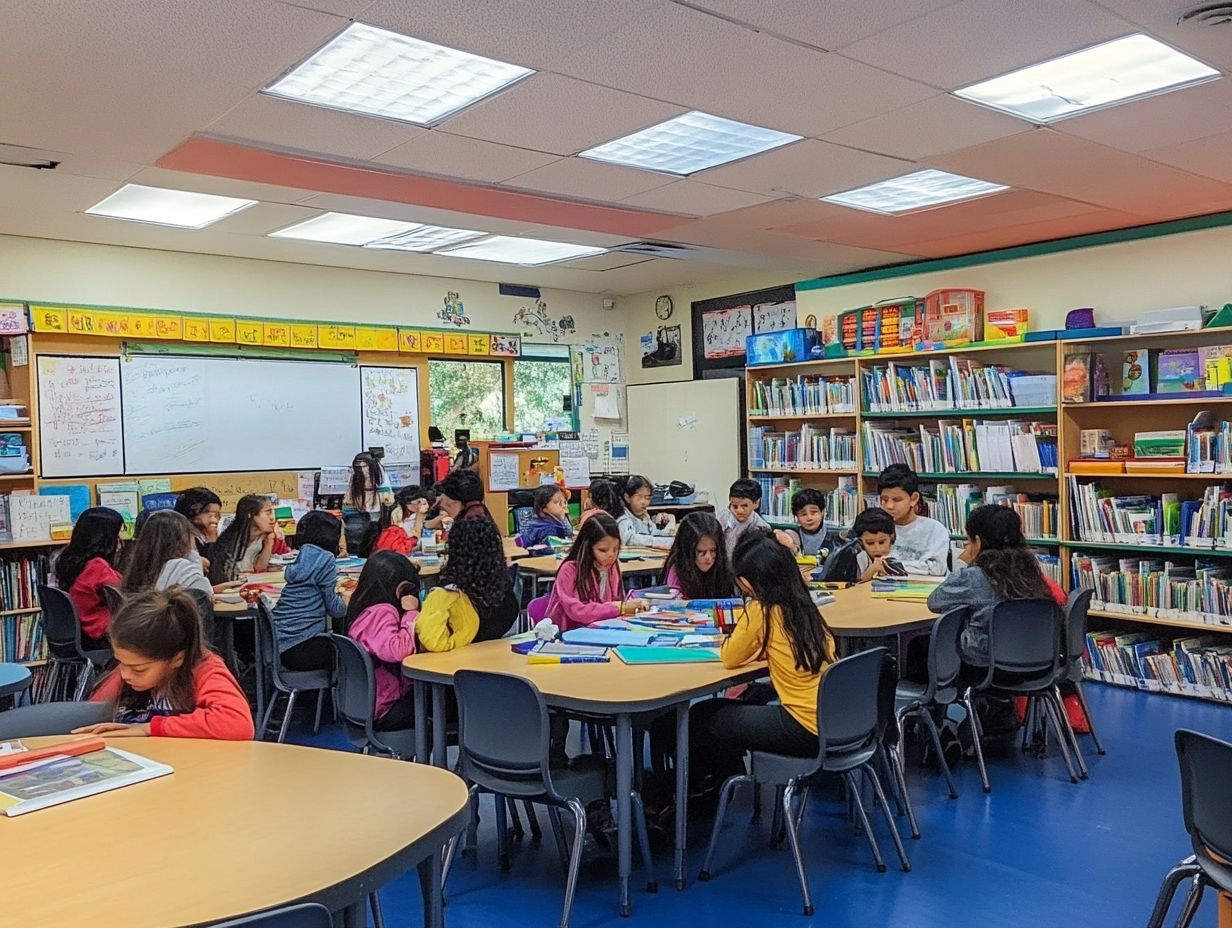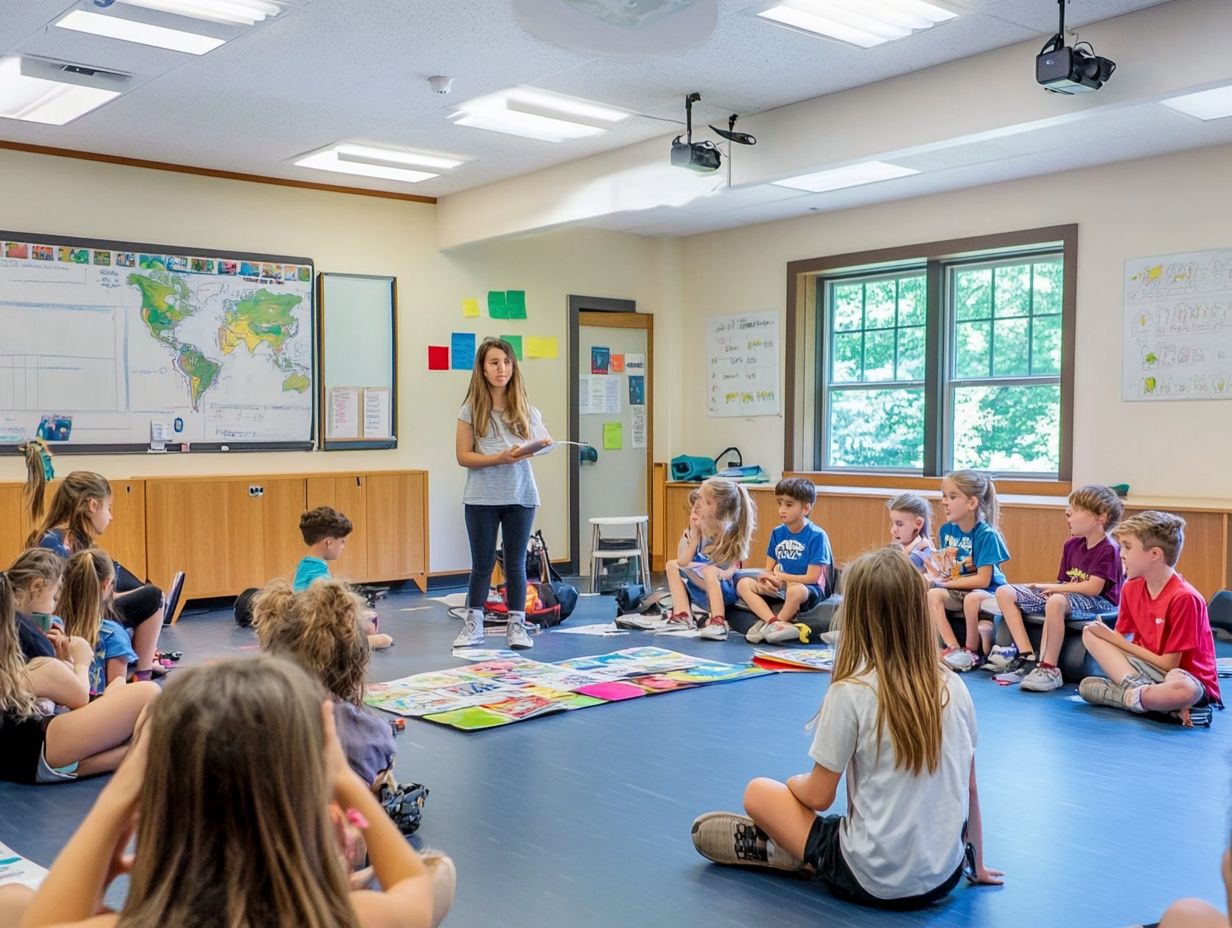the science behind language immersion effectiveness
Language immersion is a dynamic and highly effective approach to language learning that transcends the limitations of traditional classroom environments. Discover how immersion can transform your language skills!
This article invites you to explore the different types of immersion and dives into the fascinating brain science that reveals why this method is so powerful. You ll uncover how context and emotional connections are vital in enhancing your language acquisition. The extensive benefits it offers include heightened proficiency and cognitive development.
By grasping the factors that contribute to immersion’s effectiveness and learning practical strategies, you can elevate your language learning experience to new heights.
Contents
- Key Takeaways:
- The Concept of Language Immersion
- The Science Behind Language Immersion
- Benefits of Language Immersion
- Factors Affecting Language Immersion Effectiveness
- Unlock the Full Potential of Language Immersion!
- Frequently Asked Questions
- What is the science behind language immersion effectiveness?
- How does language immersion work?
- What are the benefits of language immersion?
- Is language immersion suitable for all ages?
- What factors contribute to the effectiveness of language immersion?
- Does the length of the immersion program affect its effectiveness?
Key Takeaways:

- Language immersion involves complete immersion in a foreign language, improving language proficiency and fostering cognitive development.
- The science behind language immersion shows that it creates new neural connections in the brain and relies on context and emotional connections for effective learning.
- Factors such as age, environment, consistency, and quality of immersion impact its effectiveness.
- To maximize immersion, focus on consistency and quality while incorporating helpful tips and strategies.
The Concept of Language Immersion
Language immersion is an exceptional educational approach that envelops you in an environment rich with a second language, helping you speak well and understand the culture better.
This method boosts your language acquisition and sharpens cognitive skills while enhancing cultural sensitivity and fostering social skills. It allows you to engage with native speakers and forge meaningful connections.
Programs include experiences that are rich in context, giving you the chance to practice your skills in real-life situations and elevating your reading and speaking prowess.
Prestigious institutions like Cornell University and Michigan State University have crafted effective immersion programs that truly support your educational journey.
Definition and Types of Language Immersion
Let s dive into the two exciting types of language immersion: total and partial immersion, each presenting distinct opportunities for your language acquisition journey.
In total immersion, you find yourself fully enveloped in the target language, engaging with all subjects exclusively taught in that language. This approach fosters a deeper understanding and encourages natural usage, particularly effective for young learners. It mirrors how children instinctively acquire their first language through relentless exposure and necessity.
Partial immersion balances instruction in both your native language and the target language, allowing you to gradually develop confidence and competence.
Both immersion types are incredibly advantageous, significantly enhancing your academic achievement. They stimulate critical thinking and elevate cognitive abilities, making them essential tools for nurturing language proficiency across diverse educational contexts.
The Science Behind Language Immersion
The science of language immersion offers invaluable insights into how immersive experiences profoundly affect cognitive development and brain function related to language acquisition.
Research shows that immersion programs boost metalinguistic awareness, sharpen problem-solving abilities, and nurture cognitive flexibility, all contributing to greater proficiency and fluency in a second language.
The emotional connections formed within the learning environment further intensify these benefits, as learners engage deeply with the language, leading to improved comprehension and communication skills.
By grasping these scientific principles, educators can craft more effective curricula that fully harness the advantages of language immersion. Consider exploring language immersion programs or resources to deepen your understanding further!
How Immersion Affects the Brain
Immersing yourself in a second language profoundly impacts your brain development. It enhances cognitive skills and fosters an understanding of language structure, leading to deeper language acquisition.
This approach lets you engage with the language in a meaningful way. It forges rich neural connections that enhance both retention and fluency.
Research has demonstrated that such immersive experiences elevate your vocabulary and pronunciation. They also cultivate the ability to switch between tasks easily.
Studies indicate that individuals exposed to immersive environments exhibit improved problem-solving skills and superior comprehension abilities. Your brain adapts to navigating multiple linguistic frameworks at once.
These insights highlight the critical role immersion plays not just in developing language skills but in enriching your overall cognitive functions.
The Role of Context and Emotional Connections

The role of context and emotional connections in language immersion is crucial. They foster meaningful interactions that significantly enhance your cultural sensitivity and language proficiency.
These elements deepen your understanding of the language and nurture a genuine sense of belonging and motivation. Engaging with native speakers in authentic settings makes you more inclined to pick up colloquial expressions and cultural nuances that textbooks often miss.
For example, participating in local festivals or community events offers authentic conversational practice. This makes the learning process both enjoyable and relatable.
Immersive environments like language cafes or study abroad programs allow for spontaneous dialogue. This helps solidify your language skills through real-world application. By embracing these enriching experiences, you can cultivate fluency beyond the confines of traditional classroom learning.
Benefits of Language Immersion
Language immersion presents a wealth of educational advantages that go beyond mere vocabulary acquisition. By immersing yourself in another language, you enhance your fluency, stimulate cognitive development, and elevate your academic performance across various subjects.
Students participating in immersion programs frequently exhibit superior reading and speaking abilities alongside a deeper appreciation for diverse cultures. This exciting approach not only prepares you for global challenges but also fosters lifelong learning and essential communication skills in today s interconnected landscape.
Improving Language Proficiency
One standout advantage of language immersion is the remarkable enhancement of your proficiency, including a notable boost in both reading and speaking skills.
By immersing yourself in engaging activities, you frequently interact with native speakers. This naturally sharpens your pronunciation and conversational abilities.
As a learner, you may find yourself diving into authentic literature or newspapers in your target language. This significantly improves your reading comprehension through rich context and vocabulary acquisition.
Research from the National Foreign Language Center reveals that students in immersion programs often outperform their peers on standardized language assessments. Testimonials from former participants underscore how their confidence blossomed as they navigated complex discussions.
This demonstrates that immersion not only elevates fluency but also cultivates critical thinking skills vital for effective communication. Dive into the world of language immersion and watch your skills soar!
Enhancing Cognitive Development
Language immersion is a powerful catalyst for enhancing cognitive development. It fosters critical problem-solving skills and boosts overall cognitive abilities that elevate your academic performance.
Research demonstrates that when you engage in immersive language experiences, you adapt your thinking processes to tackle complex problems more effectively. This exposure sharpens your cognitive flexibility while enhancing your memory retention and attention control.
For instance, studies show that bilingual students often outshine their monolingual peers in tasks requiring creative and abstract thinking. As you navigate between languages and cultures, you cultivate a richer toolkit for academic achievement, leading to impressive results across various subjects.
Factors Affecting Language Immersion Effectiveness
The effectiveness of language immersion hinges on several key factors, such as the age of the learners and the immersive environment.
Younger learners typically reap greater rewards due to their adaptable cognitive development. A supportive environment fosters engagement and helps dismantle language barriers.
To maximize learning outcomes, it s essential to provide high-quality and consistent immersion experiences that elevate the educational journey.
Age and Environment

Age and environment are crucial for the success of language immersion programs, especially for young learners. They adapt more readily in diverse language settings.
The interactive nature of their surroundings boosts how these young individuals absorb new languages, resulting in enhanced fluency and comprehension.
Older learners may require different strategies to engage, as their past experiences shape how they learn new languages.
By tailoring environments through engaging activities, cultural exchanges, or community involvement you can create immersive experiences for different developmental stages.
Early exposure to languages lays a foundation for lifelong learning, highlighting the importance of creating supportive places that inspire curiosity and interaction.
Consistency and Quality of Immersion
Consistency and quality are crucial for overcoming language barriers and navigating your educational journey in language learning. These elements foster an environment where language acquisition can truly thrive.
High-quality teaching practices guide you through complex linguistic challenges while building your confidence.
To enhance immersion programs, educators can implement feedback mechanisms, classroom observations, and student assessments focusing on linguistic proficiency and engagement levels.
Teachers can refine their strategies through professional development opportunities, ensuring you receive the support necessary to flourish in your language journey.
Unlock the Full Potential of Language Immersion!
To maximize the effectiveness of language immersion, adopt strategic tips and proven practices that elevate learning experiences for your students.
Foster an engaging environment that sparks curiosity, use diverse teaching methods for various learning styles, and prioritize teacher training for high-quality instruction.
By establishing a comprehensive framework, you can effectively support fluency and cognitive skill development while nurturing a deep appreciation for cultural diversity.
Tips and Strategies for Success
Implementing effective strategies for success in language immersion programs can significantly enhance your learning experience, whether you’re a student or a teacher.
Create an engaging atmosphere with interactive activities like role-playing, storytelling, and collaborative projects. These encourage communication and help you utilize the language in real-world contexts.
Foster a supportive environment where you feel comfortable taking risks and making mistakes. This promotes confidence and encourages participation, making the learning journey enjoyable.
Integrating cultural content such as traditions and global issues enriches lessons, making them relevant and stimulating. Ongoing teacher training and collaboration among educators share best practices, ensuring everyone thrives in this immersive setting.
Frequently Asked Questions
What is language immersion?
Language immersion is an educational approach where learners are exposed to a second language in a natural context.
How does age affect language immersion?
Younger learners tend to adapt more quickly and effectively to new languages, benefiting greatly from immersive environments.
What can teachers do to improve immersion programs?
Teachers can refine their techniques through professional development and by implementing diverse teaching strategies tailored to their students’ needs.
Start applying these tips today to enhance your language immersion experience!
What is the science behind language immersion effectiveness?

The science behind language immersion involves research conducted on its impact. This includes studies on how our minds work, brain functions, and the social aspects of language to understand how effective these programs are.
How does language immersion work?
Language immersion programs fully immerse students in a language other than their native one. This is achieved through daily classes, cultural activities, and interactions with native speakers. With consistent exposure and practice, students acquire language skills naturally and effectively.
What are the benefits of language immersion?
Research shows that language immersion programs offer many benefits, including:
- Boosting your brainpower!
- Increased proficiency in the target language.
- Enhanced cultural awareness and sensitivity.
- Better job opportunities in the global market.
Is language immersion suitable for all ages?
Absolutely! Don’t miss the chance to jumpstart your language journey, no matter your age! Language immersion programs can benefit learners of all ages, but younger learners have a greater potential for language acquisition due to their brain’s plasticity.
What factors contribute to the effectiveness of language immersion?
Several factors contribute to the effectiveness of these programs, including:
- The quality of instruction.
- The amount of exposure to the target language.
- The learners’ motivation and attitude.
- The support and resources available outside of the classroom.
Does the length of the immersion program affect its effectiveness?
There is no definitive answer, as it varies depending on individual learners and their specific goals. However, research suggests that longer immersion programs, lasting at least six months to a year, tend to produce more significant and lasting results in terms of language proficiency and cultural competence.






